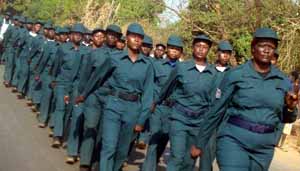
 Southern Sudanese in Juba celebrated the 100th Anniversary of the International Women’s Day-IWD yesterday. Remarked with several messages advocating for gender equality, the day observed women’s emancipation in the semi-autonomous region.
Southern Sudanese in Juba celebrated the 100th Anniversary of the International Women’s Day-IWD yesterday. Remarked with several messages advocating for gender equality, the day observed women’s emancipation in the semi-autonomous region.Organized by the Ministry of Gender, Child and Social Welfare of the Government of Southern Sudan-GOSS, the IWD drew hundreds of attendees representing 9 other States in South Sudan, civil society organizations and representatives from other non governmental organizations in Juba.
The day was characterized with different entertainment activities ranging from poetry presentations, traditional dances and drama passing out messages all advocating for gender equality and representation.
The theme of this year’s celebration is: “Equal Access to Education, Training, Science and Technology- Pathway to Decent work for Women”.
In her keynote speech, H.E Agnes Kwaje Lasuba the GOSS Minister of Gender, Child and Social Welfare underscored the efforts of the GOSS in promoting gender equality pointing out challenges hindering full representation of women in all sectors.
Following the signing of the Comprehensive Peace Agreement-CPA in 2005, GOSS has amended in its interim constitution an allocation of 25% power sharing to women as an effort to promote gender equality by the government.
Kwaje said that the IWD celebrations is a way to create awareness against gender discrimination, women’s marginalization and oppression.
“Women in South Sudan get low paid jobs due to lack of proper qualification in education. Access to education in science and technology-pathways to better jobs is one of our demands today”, affirmed the Minister.
The Gender minister reiterated that in the current population, only 28% women and 55% of men are literate.
“The gap in education should be bridged because these children are the future human resource,” the Minister emphasized.
She urged parents and guardians to take all children to school as advocated by the GOSS President in 2006.
Kwaje said that that women emancipation in Southern Sudan started decades back in the 1970s. Women’s political and social representation came to full swing during the regime of the Sudanese President Jafar Mohamed Nimeri when his ruling party-the Sudan Socialist Union encouraged women to participate in public and political affairs.
In 1974, six Southern Sudanese women were appointed as Members of Parliament. Two women each from the three provinces of the Greater-Equatoria, Bar el Ghazal and Upper Nile represented in the national parliament in Khartoum and the regional parliament of Southern Sudan.
The challenge that hindered the women emancipation again came years after when the Sudan People’s Liberation Movement-SPLM uprising escalated against the Sudanese government in 1983, she said.
Nevertheless, women joined the liberations too. Some joined in arms, others cared for the sick and wounded, others headed single left households, others lobbied for peaceful resolution to end the war and others were imprisoned in North Sudan for brewing alcohol for educating surviving children, the Minister explained in depth.
Education Support Promises
The GOSS Minister of Education H.E Michael Milli underscored the role played by women during the long Sudan civil war and the just concluded referendum in which the Southerners voted for secession.
Milli said that women acted as backbones in all efforts towards the Southern Sudanese struggles in all past years.
“After the 2005 peace deal, a lot has been done but the best has not yet been done for the women in the new nation to-be,” Milli added.
He said that as part of post referendum arrangements, the Ministry of education is working closely with international partners namely; UNICEF, UNESCO, Plan International among others to develop a suitable education program that aims at promoting girl child education.
Milli identified some retrogressive activities in Rumbek that affect women emancipation in the region. “In Rumbek, two girls were being forced to marry instead of continuing with school. I hope this is the first and the last in Southern Sudan,” the Minister cautioned.
In this year’s IWD United Nations message read during the function by the UN Program Manager, South Sudan Lucie Luguga, the United Nations explained that women’s violation in the world still ranks high in many countries mainly in conflict zones.
“In too many countries and societies, women remain second class citizens. Women and girls continue to endure unacceptable discrimination and violence often at the hands of intimate partners, relatives, their homes, work places.” Lucile said.
Article viewed at: Oye! Times at www.oyetimes.com

Be the first to comment